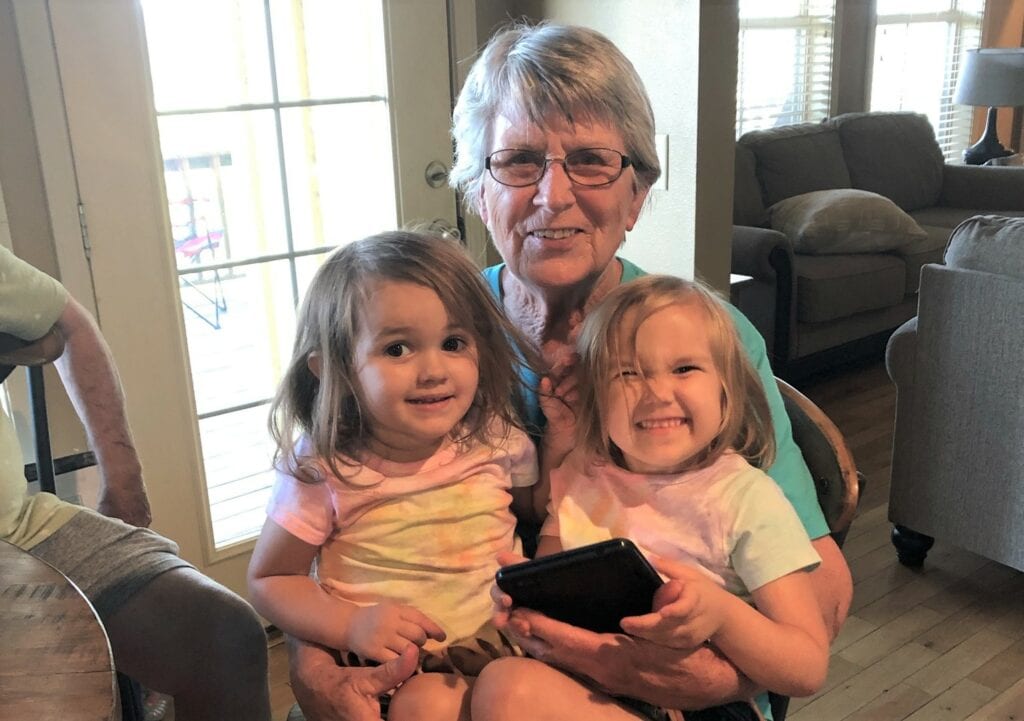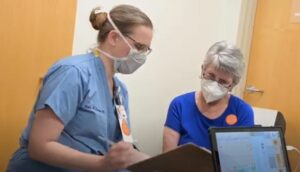
Cornelia Ann Smith’s severe chronic back pain disappeared almost as soon as the experimental spinal cord stimulator was activated in a procedure at the University of Arkansas for Medical Sciences (UAMS).

“I realized the device was helping me immediately,” the Calico Rock, Ark., resident said. Then, back home, it really began to sink in.
“I was sitting on the couch, and I thought, ‘This is amazing.’”
For six years prior to the implant, she struggled to take care of her home and her husband, who has Parkinson’s disease, and she could not enjoy her many hobbies.
“It felt like a bonfire in my back, and there was nothing anyone could do about it,” she said.
When she learned that UAMS was testing the spinal cord stimulator in a clinical trial, she contacted UAMS and was referred to neurosurgeon Erika Petersen, M.D., who is leading the device study.
“We talked about what her goals should be,” said Petersen, a national leader in spinal cord stimulation for chronic pain. “She wanted to be able to garden and go fishing and play with her grandchildren.”
Smith had many questions about the surgical implant procedure.
“After speaking with Dr. Petersen and hearing why she was confident in the device and her confidence in the procedure, I was all for it — 100%,” she said.
Prior generations of spinal cord stimulation devices include a small remote control that the patient uses to adjust the level of electronic stimulation if their pain spikes.
In January 2021, Smith became the first Arkansan to benefit from the latest technology. The so-called closed-loop experimental device does not require manual adjustment of the electronic stimulation; the system monitors the patient’s pain and adjusts the stimulation as needed.
The device was developed by Saluda Medical of Artarmon, New South Wales, Australia, and is being tested in the ECAP (evoked compound action potential) study.
“I would say this is a pretty big advance,” said Petersen, a professor in the College of Medicine Department of Neurosurgery. “This is the difference between constantly having to maintain the device and interact with it to being able to forget it and let it be in the background. That means people are able to stop thinking about where they are with their chronic pain control and just think about what they want to do during their day.”
Petersen said other study participants have reported pain decreases of more than half and up to 100%, like Smith.
“We are seeing some great results so far, and it’s significant that their pain relief is being sustained over time,” Petersen said.
UAMS is one of 13 research sites in the United States participating in the study.
“I’ve been really excited to be in the field of neuromodulation for the past decade because we have had an explosion in these sorts of technologies starting from about 2015, with more and more innovations coming,” Petersen said. “With every innovation we have an opportunity to help more people who have chronic nerve damage related problems.”
UAMS is still recruiting participants for the study. Those interested in participating must be referred through the UAMS Pain Clinic, which assesses patients to determine if they are eligible.
The study is supported by the UAMS Translational Research Institute, where research nurse coordinator Lisa Richardson, RN, works closely with the study participants.
“Being a part of this research study has been a pleasant experience,” Smith said. “It’s been eye-opening. Lisa checks on me often and she gave me her phone number so I can call her any time I need to.”
In a follow-up visit to UAMS on Oct. 28, 2021, Smith reported that she remains pain free.
“It has changed my life,” she said.
Watch a video here about Smith’s experience in the clinical trial.
